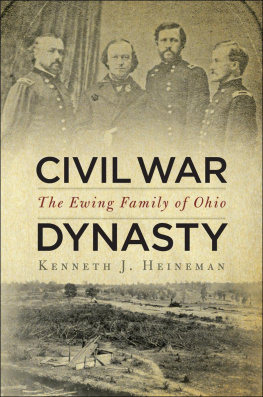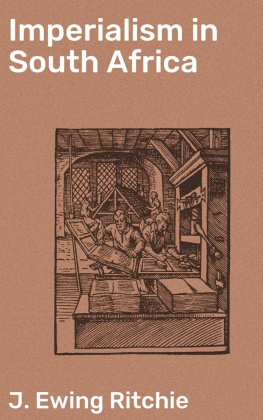Thank you for buying this ebook, published by NYU Press.
Sign up for our e-newsletters to receive information about forthcoming books, special discounts, and more!
Sign Up!
About NYU Press
A publisher of original scholarship since its founding in 1916, New York University Press Produces more than 100 new books each year, with a backlist of 3,000 titles in print. Working across the humanities and social sciences, NYU Press has award-winning lists in sociology, law, cultural and American studies, religion, American history, anthropology, politics, criminology, media and communication, literary studies, and psychology.
CIVIL WAR DYNASTY
Civil War Dynasty
The Ewing Family of Ohio
Kenneth J. Heineman
NEW YORK UNIVERSITY PRESS
New York and London
www.nyupress.org
2013 by New York University
All rights reserved
References to Internet websites (URLs) were accurate at the time of writing.
Neither the author nor New York University Press is responsible for URLs that may have expired or changed since the manuscript was prepared.
LIBRARY OF CONGRESS CATALOGING-IN-PUBLICATION DATA
Heineman, Kenneth J., 1962
Civil War dynasty : the Ewing family of Ohio/Kenneth J. Heineman.
p. cm.
Includes bibliographical references and index.
ISBN 978-0-8147-7301-7 (cl : alk. paper)
ISBN 978-0-8147-7302-4 (e-book)
ISBN 978-0-8147-9070-0 (e-book)
1. OhioHistoryCivil War, 1861-1865. 2. United StatesHistoryCivil War, 18611865Campaigns. 3. Ewing family. 4. Ewing, Thomas,1829-1896. 5. Sherman, William T. (William Tecumseh), 1820-1891Family. I. Title.
E525.H45 2012
973.7471dc23 2012027274
New York University Press books are printed on acid-free paper, and their binding materials are chosen for strength and durability.
We strive to use environmentally responsible suppliers and materials to the greatest extent possible in publishing our books.
Manufactured in the United States of America
10 9 8 7 6 5 4 3 2 1
Arms and the man I sing, who first made way,
Predestined exile, from the Trojan shore
To Italy, the blest Lavinian strand.
Smitten of storms he was on land and sea
By violence of Heaven, to satisfy
Stern Junos sleepless wrath; and much in war
He suffered, seeking at the last to found
The city, and bring oer his fathers gods
To safe abode in Latium; whence arose
The Latin race, old Albas reverend lords,
And from her hills wide-walled, imperial Rome.
The Aeneid
GILBERT D. HEINEMAN (19192002)
Guadalcanal, Bougainville, New Georgia
TERRY G. HEINEMAN (19472008)
South Vietnam
CONTENTS
ACKNOWLEDGMENTS
Every student of history owes a great debt to the organizations and archivists who make reconstruction of the past possible. The Kansas State Historical Society, the Ohio Historical Society, the University of Notre Dame Archives, the Library of Congress, and the National Archives are treasuresas are their respective staffs.
I must express great appreciation to Nicole McDaniel at Angelo State University, as well as to her industrious students in English 4360, Professional Editingincluding Amanda Cooper, Cate Cuba, Mindy Armitage, Tyler Carson, Christine Stone, John Phair, and Patricia Larson. I also greatly appreciate the encouragement given to me by my senior scholars, notably Arnoldo DeLeon and Joe Zheng. Their professional engagement, as well as their friendship, has meant much to me since my arrival in 2009.
Before I came to Texas, I had spent eighteen years in Lancaster, Ohio, home of the Ewing dynasty. It is entirely due to the efforts of the fine folks at the Fairfield Heritage Association (FHA) and the Sherman House Museum that I developed an interest in the Ewing family. To Diane Eversole, Joyce Harvey, and Frank and Laura Bullock: thank you for persuading me in 2005 that it would be a good idea for me to grow a beard, wear a heavy woolen outfit, and play General Hugh Ewing on a hot fall evening at the former Ohio fairgrounds. Subsequently, I had the pleasure of joining Andy McGreevy, an Ohio UniversityLancaster history colleague, on FHA-sponsored tours of Gettysburg and Springfield.
I must also thank one Ohioan and three Pennsylvania friends for their insights on Civil Warera politics: Chris Phillips, Randall Miller, Michael Birkner, and Van Beck Hall. As a graduate student at Pitt, I always knew Van Beck Hall was well read. After one conversation with him at a meeting of the Pennsylvania Historical Association at which he rattled off numerous works related to the economic history of the Kanawha Valley saltworks, however, I realized something else: he is always the smartest man in any room.
Debbie Gershenowitz at NYU Press believed in this project and worked tirelessly to see it come to fruition. She is, without a doubt, the best book editor I have ever had.
Finally, I thank Theresa Heineman and our two wonderful children, Natalie and Grace, for their encouragement. Working on this book has been a lot like going back to graduate school, but so much better than the first time around because of their presence in my life.
Introduction
Ellen Ewing Sherman had seen her share of death. At William Tecumseh Shermans encampment near Vicksburg, Mississippi, she had toured abandoned entrenchments laden with blood. It was during Ellens visit with her husband in the summer of 1863 that their son Willie had fallen sick. He died before Ellen could reach her parents in Lancaster, Ohio. That same fall, Ellens mother, Maria Boyle Ewing, entered the final stages of a terminal illness. Her father, Thomas Ewing, had already suffered a series of heart attacks since the beginning of the war.
If the deaths of Maria and Willie had shaken Ellen to her corefollowed by the loss of another child while Sherman was marching through Georgiaher fathers decline was devastating. He had always been a source of calm in Ellens turbulent life. By sheer willpower Ewing had rallied so he could continue his law practice in Washington. He collapsed while presenting a case before the U.S. Supreme Court in 1869. Remarkably, Ewing was not yet counted out. Now, two years later, Ellen sat by her fathers bedside in Lancaster on a deathwatch. Her husband kept his distance, harboring mixed
As Ewings life slipped away on October 26, 1871, his reputation had already assumed legendary proportions. He was the impoverished Salt Boiler of Virginias Kanawha Valley who had gone on to become a U.S. senator and serve in the administrations of Presidents William Henry Harrison and Zachary Taylor. Although Ewing had not known Taylor before his 1848 campaign, he found him to be a lively storyteller and keen observer of human foibles. Taylor had an honored place at Ellens wedding in 1850a fact Sherman underscored when trying to impress military superiors and prospective business associates.
In his first Senate term (183137), Ewing sat next to the prickly Henry Clay of Kentucky and behind the eloquent Daniel Webster of Massachusetts. Ewing often mediated disputes between these rival leaders of the Whig Party, and he became especially close to Webster. Indeed, Webster and Ewing were like impish schoolboys, whispering wry observations about their colleagues in Latin lest anyone might be listening. Whether in committee meetings or in debates on the Senate floor, Ewing gained equal measures of respect and bile as the Logician of the West. Webster believed he had never met a more intelligent man, while Treasury Secretary William Meredith, who also served in Taylors cabinet, said of Ewing: His reasoning was like a sledgehammer, and woe betide the antagonist who mistook its weight. Even a few of his critics acknowledged him as a statesman who was inclined to be what some would term jovial.







